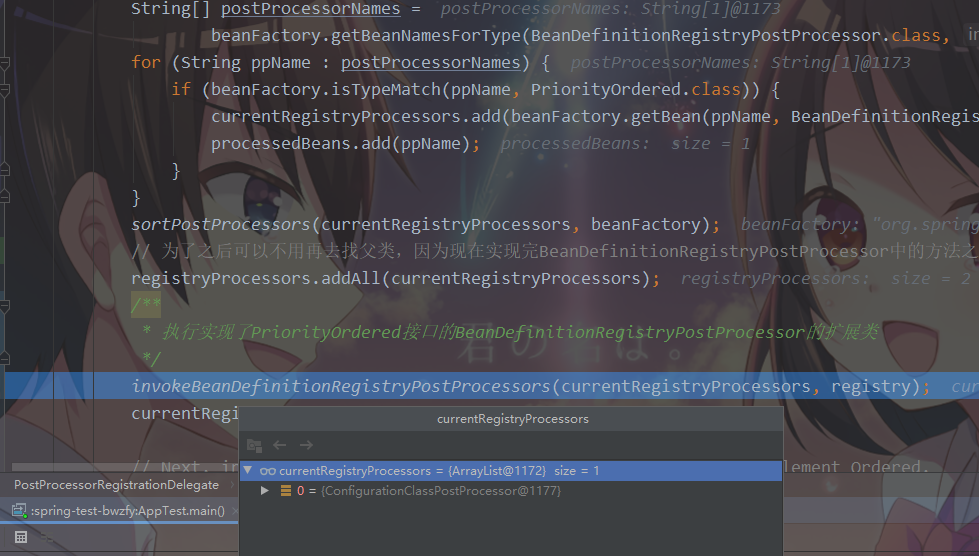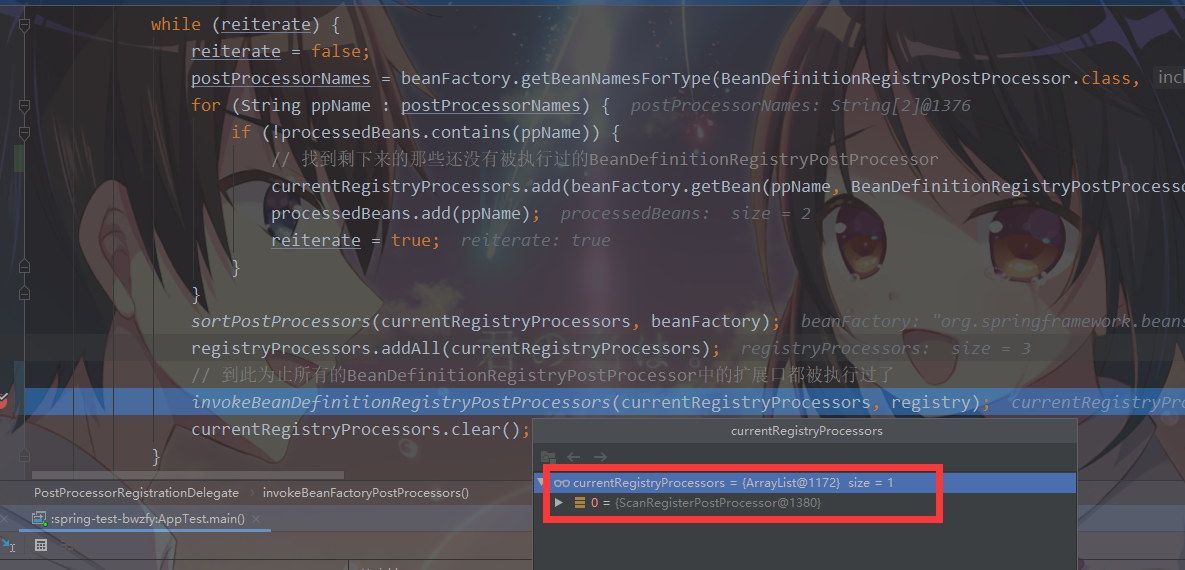invokeBeanFactoryPostProcessors就是将项目中的BeanDefinition加载进beanDefinitionMap中,并且对BeanFactoryPostProcess的实现类进行回调的地方。
先往spring容器中加入四个扩展类,便于下面演示。
HandFactoryPostProcessor: 手动的往spring容器中加入的BeanFactoryPostProcessor的实现类
public class HandFactoryPostProcessor implements BeanFactoryPostProcessor {
@Override
public void postProcessBeanFactory(ConfigurableListableBeanFactory beanFactory) throws BeansException {
System.out.println("HandFactoryPostProcessor ---> postProcessBeanFactory");
}
}
HandRegisterPostProcessor:手动的往spring容器中加入的BeanDefinitionRegistryPostProcessor的实现类
public class HandRegisterPostProcessor implements BeanDefinitionRegistryPostProcessor {
@Override
public void postProcessBeanDefinitionRegistry(BeanDefinitionRegistry registry) throws BeansException {
System.out.println("HandRegisterPostProcessor ---> postProcessBeanDefinitionRegistry");
}
@Override
public void postProcessBeanFactory(ConfigurableListableBeanFactory beanFactory) throws BeansException {
System.out.println("HandRegisterPostProcessor ---> postProcessBeanFactory");
}
}
ScanFactoryPostProcessor:通过注解的方式往spring容器中加入的BeanFactoryPostProcessor的实现类
@Component
public class ScanFactoryPostProcessor implements BeanFactoryPostProcessor {
@Override
public void postProcessBeanFactory(ConfigurableListableBeanFactory beanFactory) throws BeansException {
System.out.println("ScanFactoryPostProcessor ---> postProcessBeanFactory");
}
}
ScanRegisterPostProcessor:通过注解的方式往spring容器中加入的BeanDefinitionRegistryPostProcessor的实现类
@Component
public class ScanRegisterPostProcessor implements BeanDefinitionRegistryPostProcessor {
@Override
public void postProcessBeanDefinitionRegistry(BeanDefinitionRegistry registry) throws BeansException {
System.out.println("ScanRegisterPostProcessor ---> postProcessBeanDefinitionRegistry");
}
@Override
public void postProcessBeanFactory(ConfigurableListableBeanFactory beanFactory) throws BeansException {
System.out.println("ScanRegisterPostProcessor ---> postProcessBeanFactory");
}
}
这里说的程序员手动加入是指,在执行spring容器的refresh方法之前就,通过调用容器的接口,手动的往容器中加入BeanDefinitionRegistryPostProcessor接口的实现类的做法,代码如下。
AnnotationConfigApplicationContext ioc = new AnnotationConfigApplicationContext();
// 手动加入HandFactoryPostProcessor和HandRegisterPostProcessor
ioc.addBeanFactoryPostProcessor(new HandFactoryPostProcessor());
ioc.addBeanFactoryPostProcessor(new HandRegisterPostProcessor());
ioc.register(AppConfig.class);
ioc.refresh();
invokeBeanFactoryPostProcessors方法的执行主要包括一下几个部分:
-
执行程序员手动加入到容器中的BeanDefinitionRegistryPostProcessor接口的实现类。
源码如下:
for (BeanFactoryPostProcessor postProcessor : beanFactoryPostProcessors) { if (postProcessor instanceof BeanDefinitionRegistryPostProcessor) { BeanDefinitionRegistryPostProcessor registryProcessor = (BeanDefinitionRegistryPostProcessor) postProcessor; // 此处即为执行手动加入到容器中的BeanDefinitionRegistryPostProcessor接口的实现类。 registryProcessor.postProcessBeanDefinitionRegistry(registry); registryProcessors.add(registryProcessor); } else { // 只实现BeanFactoryPostProcessor接口的扩展接口 regularPostProcessors.add(postProcessor); } }运行完上述源码的控制台结果如下:
执行了通过手动方式加入到容器中的BeanDefinitionRegistryPostProcessor接口的实现类
-
调用实现了PriorityOrdered接口的BeanDefinitionRegistryPostProcessor的扩展类
ps:在这一步所执行的扩展类可以是spring自带的扩展类或是程序员往程序中加入的,平时主要是执行spring自带的扩展类比如ConfigurationClassPostProcessor:用于解析往spring容器中注入BeanDefinition的注解@Configuration, @Bean, @Service, @Component, @Repository, @Import等。
源代码如下:
// Do not initialize FactoryBeans here: We need to leave all regular beans // uninitialized to let the bean factory post-processors apply to them! // Separate between BeanDefinitionRegistryPostProcessors that implement // PriorityOrdered, Ordered, and the rest. List<BeanDefinitionRegistryPostProcessor> currentRegistryProcessors = new ArrayList<>(); // First, invoke the BeanDefinitionRegistryPostProcessors that implement PriorityOrdered. String[] postProcessorNames = beanFactory.getBeanNamesForType(BeanDefinitionRegistryPostProcessor.class, true, false); for (String ppName : postProcessorNames) { if (beanFactory.isTypeMatch(ppName, PriorityOrdered.class)) { currentRegistryProcessors.add(beanFactory.getBean(ppName, BeanDefinitionRegistryPostProcessor.class)); processedBeans.add(ppName); } } sortPostProcessors(currentRegistryProcessors, beanFactory); // 为了之后可以不用再去找父类,因为现在实现完BeanDefinitionRegistryPostProcessor中的方法之后,后面还需要用到这个扩展类 registryProcessors.addAll(currentRegistryProcessors); /** * 执行实现了PriorityOrdered接口的BeanDefinitionRegistryPostProcessor的扩展类 */ invokeBeanDefinitionRegistryPostProcessors(currentRegistryProcessors, registry); currentRegistryProcessors.clear();运行到此阶段执行的BeanDefinitionRegistryPostProcessor扩展类如下:
-
调用实现了Ordered接口的BeanDefinitionRegistryPostProcessor的扩展类。
源码如下:
// Next, invoke the BeanDefinitionRegistryPostProcessors that implement Ordered. postProcessorNames = beanFactory.getBeanNamesForType(BeanDefinitionRegistryPostProcessor.class, true, false); for (String ppName : postProcessorNames) { if (!processedBeans.contains(ppName) && beanFactory.isTypeMatch(ppName, Ordered.class)) { currentRegistryProcessors.add(beanFactory.getBean(ppName, BeanDefinitionRegistryPostProcessor.class)); processedBeans.add(ppName); } } sortPostProcessors(currentRegistryProcessors, beanFactory); registryProcessors.addAll(currentRegistryProcessors); invokeBeanDefinitionRegistryPostProcessors(currentRegistryProcessors, registry); currentRegistryProcessors.clear();执行逻辑与调用实现了PriorityOrdered接口的BeanDefinitionRegistryPostProcessor的扩展类类似。
-
调用没有实现PriorityOrdered和Ordered接口BeanDefinitionRegistryPostProcessor的扩展类。(这一步执行完之后BeanDefinitionRegistryPostProcessor的扩展类都执行完了)
源码如下:
// Finally, invoke all other BeanDefinitionRegistryPostProcessors until no further ones appear. boolean reiterate = true; while (reiterate) { reiterate = false; postProcessorNames = beanFactory.getBeanNamesForType(BeanDefinitionRegistryPostProcessor.class, true, false); for (String ppName : postProcessorNames) { if (!processedBeans.contains(ppName)) { // 找到剩下来的那些还没有被执行过的BeanDefinitionRegistryPostProcessor currentRegistryProcessors.add(beanFactory.getBean(ppName, BeanDefinitionRegistryPostProcessor.class)); processedBeans.add(ppName); reiterate = true; } } sortPostProcessors(currentRegistryProcessors, beanFactory); registryProcessors.addAll(currentRegistryProcessors); // 到此为止所有的BeanDefinitionRegistryPostProcessor中的扩展口都被执行过了 invokeBeanDefinitionRegistryPostProcessors(currentRegistryProcessors, registry); currentRegistryProcessors.clear(); }这里调用的BeanDefinitionRegistryPostProcessor接口的实现类如下:
执行结果:
-
调用BeanDefinitionRegistryPostProcessor的父类方法(因为BeanDefinitionRegistryPostProcessor接口也是继承了BeanFactoryPostProcessor接口,所以BeanDefinitionRegistryPostProcessor的父类方法就是指的扩展类中的postProcessBeanFactory方法)
源码如下:
// registryProcessors 为 List<BeanDefinitionRegistryPostProcessor>,是之前调用的所有的BeanDefinitionRegistryPostProcessor接口的实现类。 invokeBeanFactoryPostProcessors(registryProcessors, beanFactory);
执行结果是:
-
调用程序员手动加入到容器中的BeanFactoryPostProcessors的扩展类。
源码如下:
// regularPostProcessors,为先前手动加入到spring容器中的BeanFactoryPostProcessors接口的实现类 invokeBeanFactoryPostProcessors(regularPostProcessors, beanFactory);执行结果:
-
调用实现了PriorityOrdered接口的BeanFactoryPostProcessors的扩展类。
源码如下:
// Separate between BeanFactoryPostProcessors that implement PriorityOrdered, // Ordered, and the rest. List<BeanFactoryPostProcessor> priorityOrderedPostProcessors = new ArrayList<>(); List<String> orderedPostProcessorNames = new ArrayList<>(); List<String> nonOrderedPostProcessorNames = new ArrayList<>(); for (String ppName : postProcessorNames) { if (processedBeans.contains(ppName)) { // skip - already processed in first phase above } else if (beanFactory.isTypeMatch(ppName, PriorityOrdered.class)) { priorityOrderedPostProcessors.add(beanFactory.getBean(ppName, BeanFactoryPostProcessor.class)); } else if (beanFactory.isTypeMatch(ppName, Ordered.class)) { orderedPostProcessorNames.add(ppName); } else { nonOrderedPostProcessorNames.add(ppName); } } // First, invoke the BeanFactoryPostProcessors that implement PriorityOrdered. sortPostProcessors(priorityOrderedPostProcessors, beanFactory); invokeBeanFactoryPostProcessors(priorityOrderedPostProcessors, beanFactory);和上述执行实现了PriorityOrdered接口的BeanDefinitionRegistryPostProcessor的扩展类逻辑一致。
-
调用实现了Ordered接口的BeanFactoryPostProcessors的扩展类。
源码如下:
// Next, invoke the BeanFactoryPostProcessors that implement Ordered. List<BeanFactoryPostProcessor> orderedPostProcessors = new ArrayList<>(orderedPostProcessorNames.size()); for (String postProcessorName : orderedPostProcessorNames) { orderedPostProcessors.add(beanFactory.getBean(postProcessorName, BeanFactoryPostProcessor.class)); } sortPostProcessors(orderedPostProcessors, beanFactory); invokeBeanFactoryPostProcessors(orderedPostProcessors, beanFactory);
-
调用没有实现PriorityOrdered和Ordered接口的BeanFactoryPostProcessors的扩展类。
源码如下:
// Finally, invoke all other BeanFactoryPostProcessors. List<BeanFactoryPostProcessor> nonOrderedPostProcessors = new ArrayList<>(nonOrderedPostProcessorNames.size()); for (String postProcessorName : nonOrderedPostProcessorNames) { nonOrderedPostProcessors.add(beanFactory.getBean(postProcessorName, BeanFactoryPostProcessor.class)); } invokeBeanFactoryPostProcessors(nonOrderedPostProcessors, beanFactory);执行结果:







